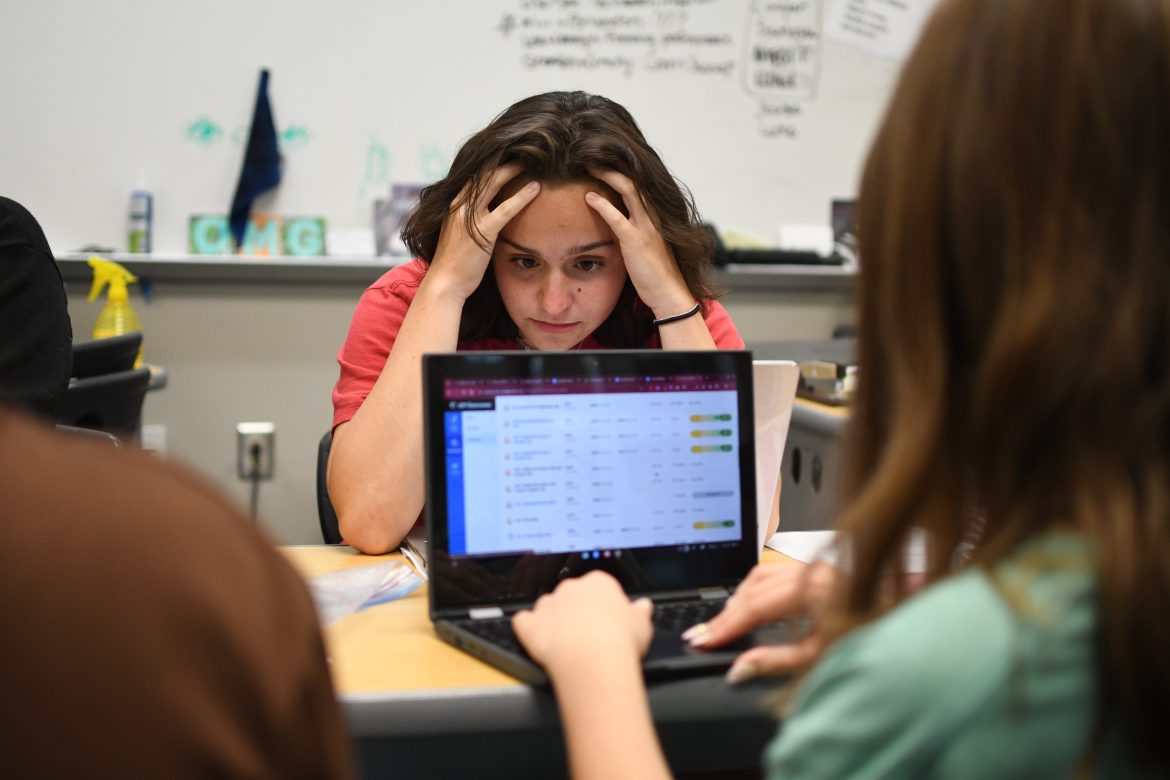ODYSSEY Media Group Variety Staffer Maggie Monk has a crisis while taking a practice AP English Literature Free Response Question on May 1 in Room 231. Monk has struggled with dyslexia her entire life and has tried to mask her struggles throughout high school, but fails while taking the practice FRQ. “ But, even after months of studying and dedication to the class, I still struggle. I begin to panic,” Monk wrote. Photo by Aza Khan
Variety Staffer Maggie Monk reflects on how dyslexia has impacted her everyday life.
Words jump out at me from the screen, starting to feel bigger than me. I shrink, almost instantly. My whole body tenses up to keep in my frustration. I can’t let my peers see that I’m struggling to do a task so simple for them: read.
I’m preparing for my AP English Literature and Composition review session for the upcoming exam. But, even after months of studying and dedication to the class, I still struggle. I begin to panic.
My classmates can see that I’m not typing like them. They can see me pulling my hair, trying so hard to simply read. This experience isn’t new to me, though, and I’m suddenly brought back to my childhood.
I’m brought back to the feeling of shame and embarrassment. Instead of seeing the words on the screen, I see my name displayed at the bottom of the reading level chart for the entire class to see in elementary school.
I’m brought back to the feeling of shame and embarrassment. Instead of seeing the words on the screen, I see my name displayed at the bottom of the reading level chart for the entire class to see in elementary school.
They can see what I’ve tried to mask all of high school – in one slight moment.
I haven’t felt that small in over five years.
As I sit there, trying to bottle up my frustration, one student notices and tries to make me feel better by trying to relate to me.
“I’m a slow reader sometimes, too,” he said.
Despite good intentions, comments like these make me crumble.
I’m not slow, I simply just cannot read. Why don’t you understand? We are not the same.
I couldn’t completely crack in front of everyone. When I arrived home, I cried just like I used to in elementary school. I cried like when I was called a slur or when my teachers refused to accommodate me because of the “stigma” of special education.
Such a brief moment of struggle tore me to the ground.
I never thought I would have this moment while taking a practice Free Response Question to review for the upcoming AP English Literature exam. I worked all semester to complete FRQs well. My confidence grew exponentially throughout the fall semester.
I was confident in my ability to write a great response, but that was demolished so quickly. I can’t even read the prompt. It’s not fair.
… I’ve learned to not let moments like these negatively impact the way I view myself. My dyslexia does not define who I am or what I can accomplish. Every day I’m learning to adapt by controlling the way I react during these moments.
Despite my frustration, I’ve learned to not let moments like these negatively impact the way I view myself. My dyslexia does not define who I am or what I can accomplish. Every day I’m learning to adapt by controlling the way I react during these moments.
It’s taken me a long time to adapt to my dyslexia, and I still struggle with it to this day. However, I won’t let it hold me back.
Come my AP exam on May 8, I am determined not to let myself be overwhelmed with frustration.
